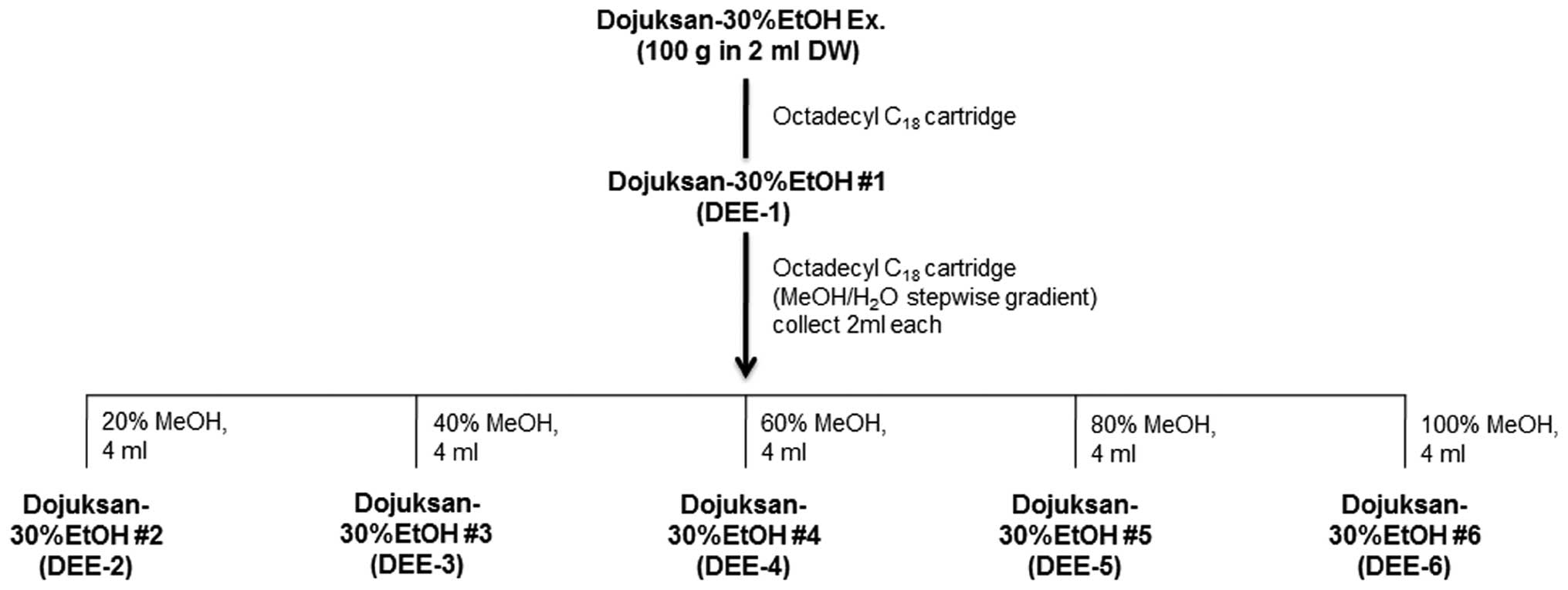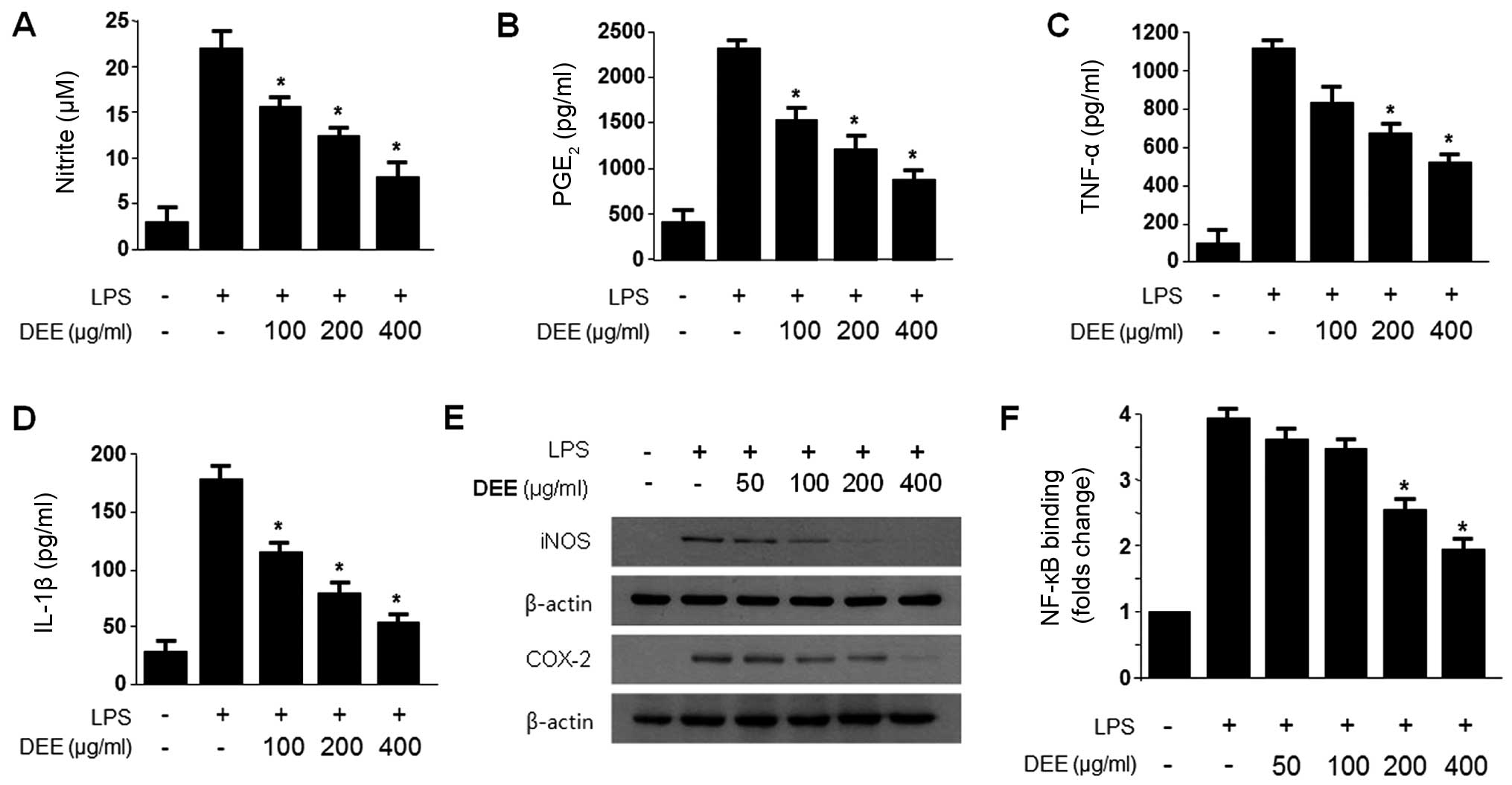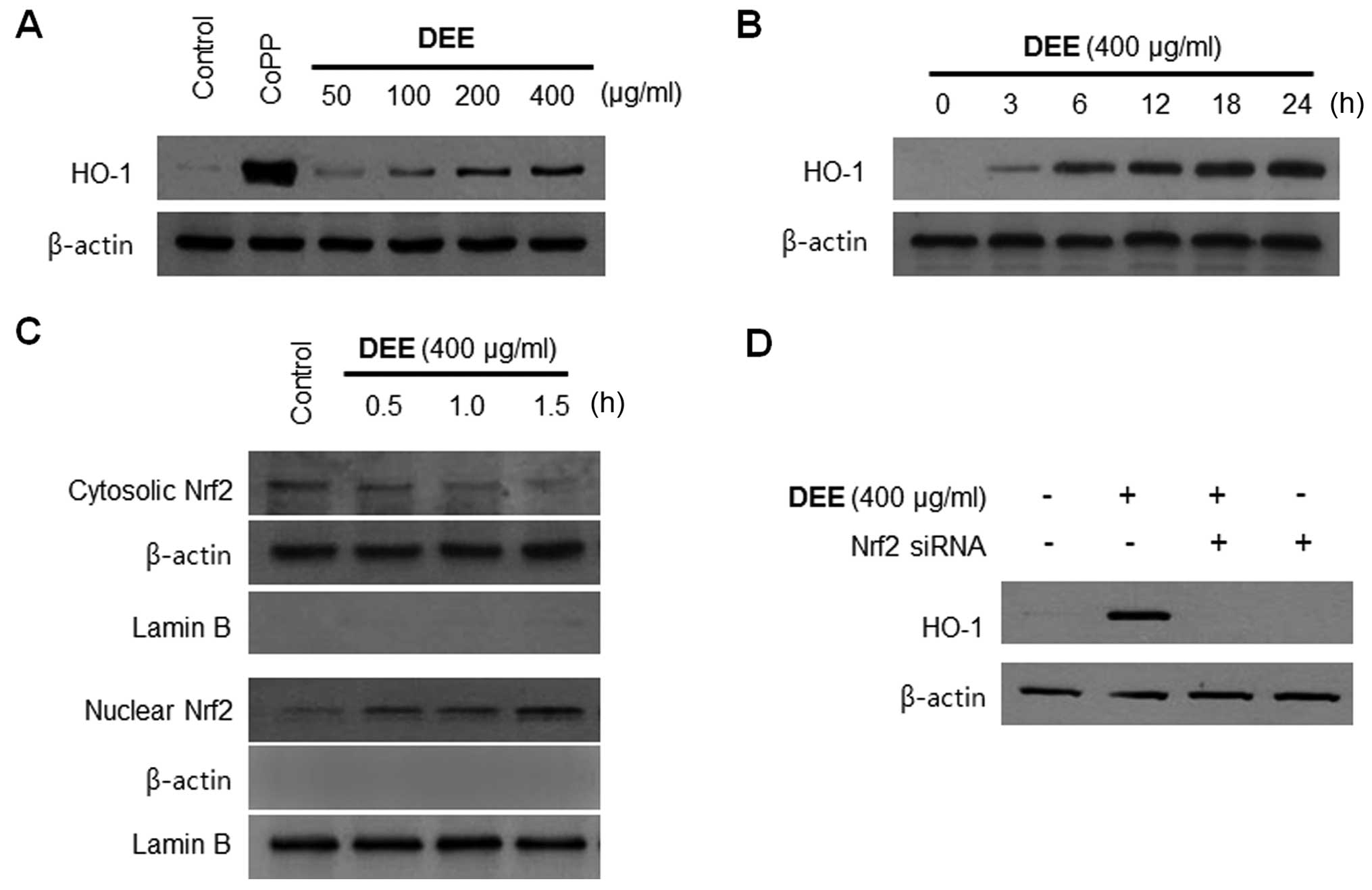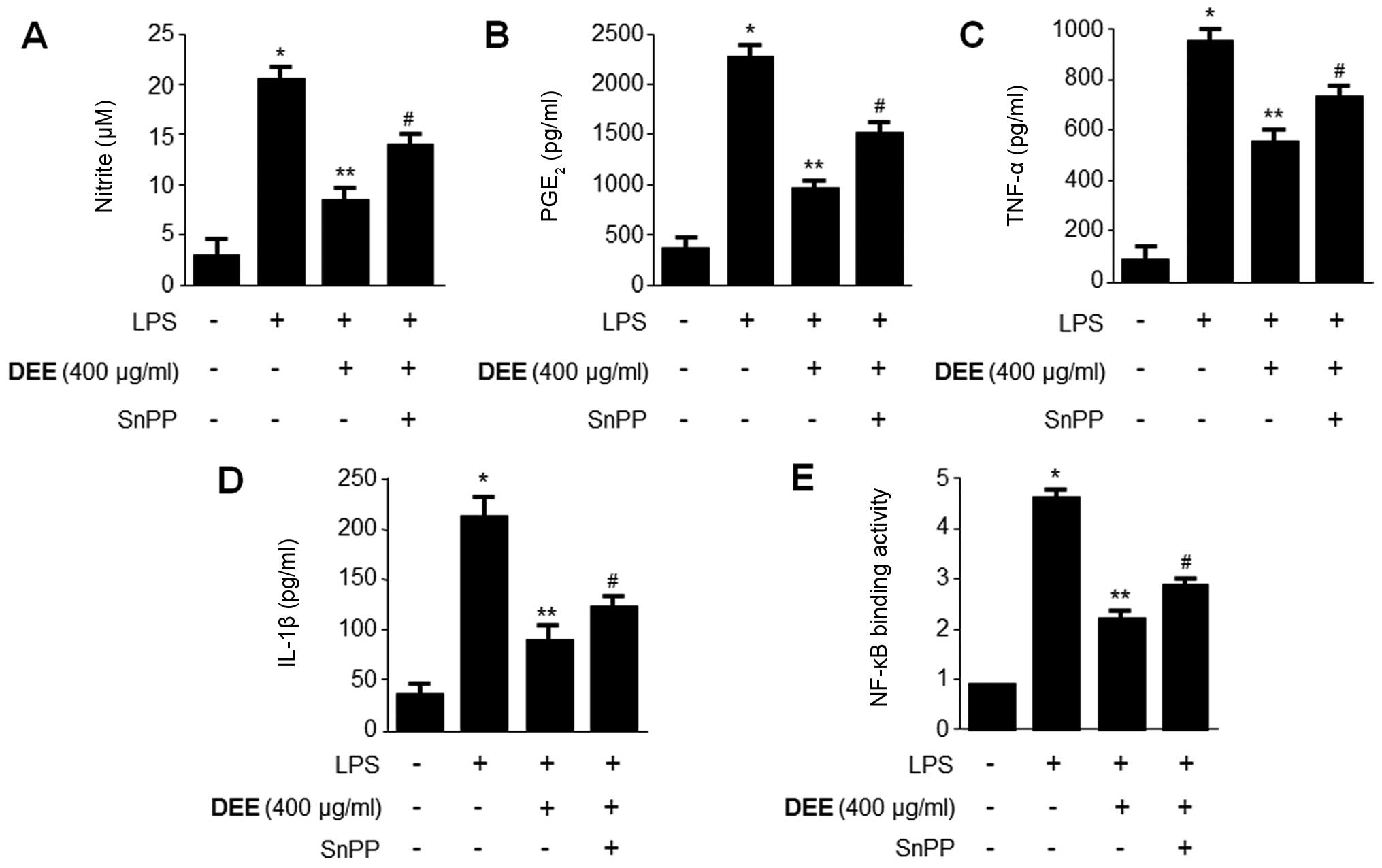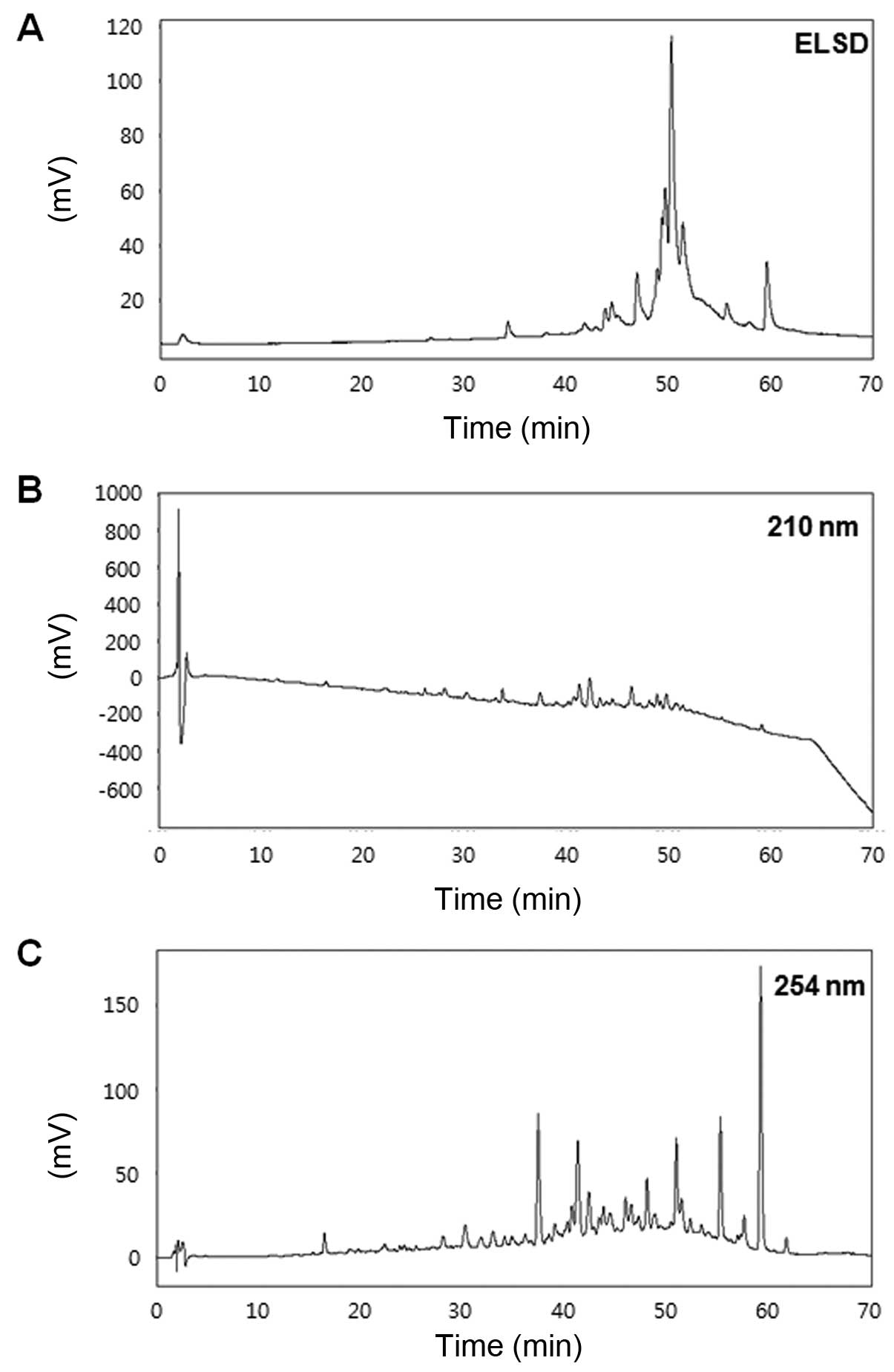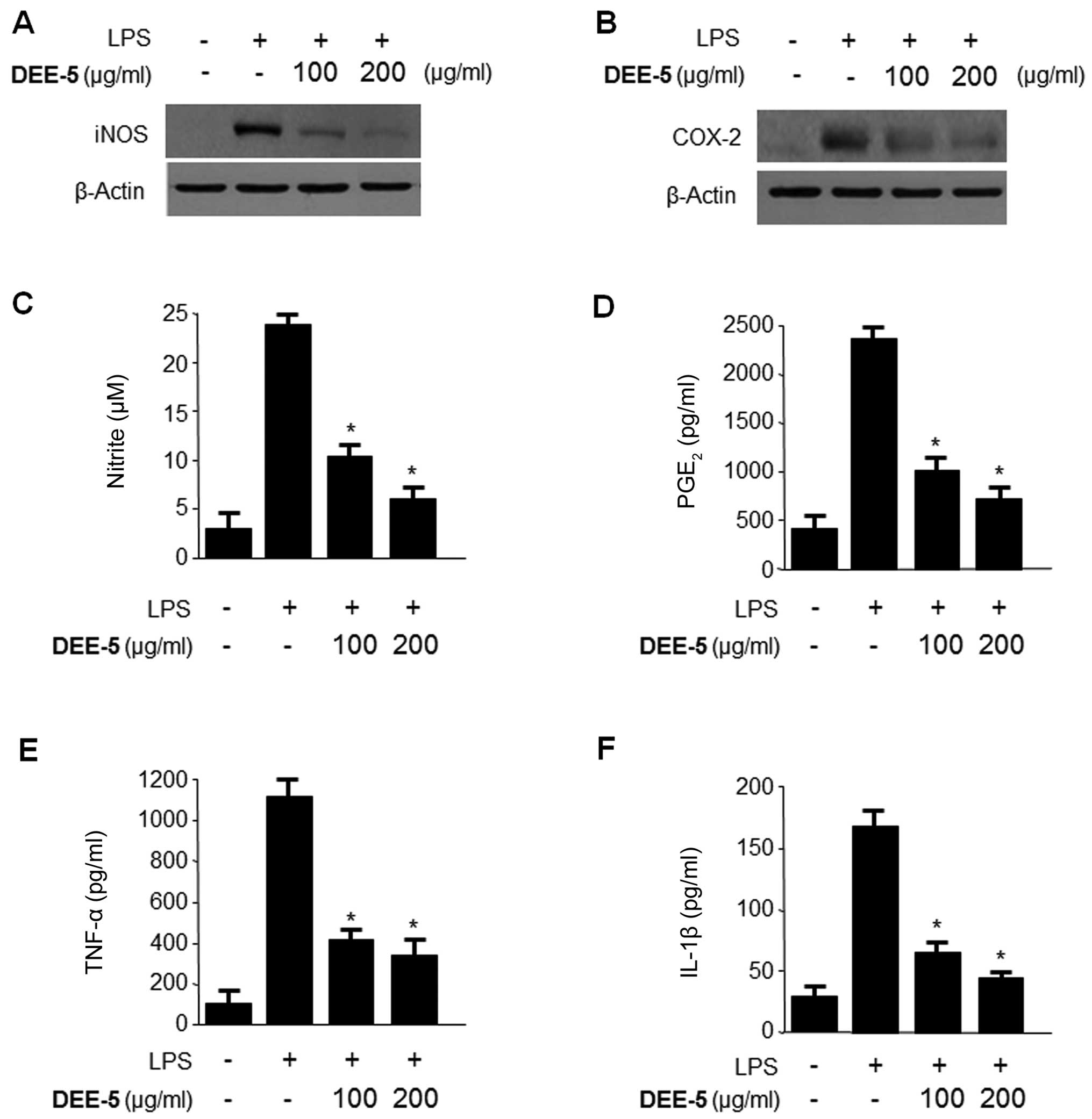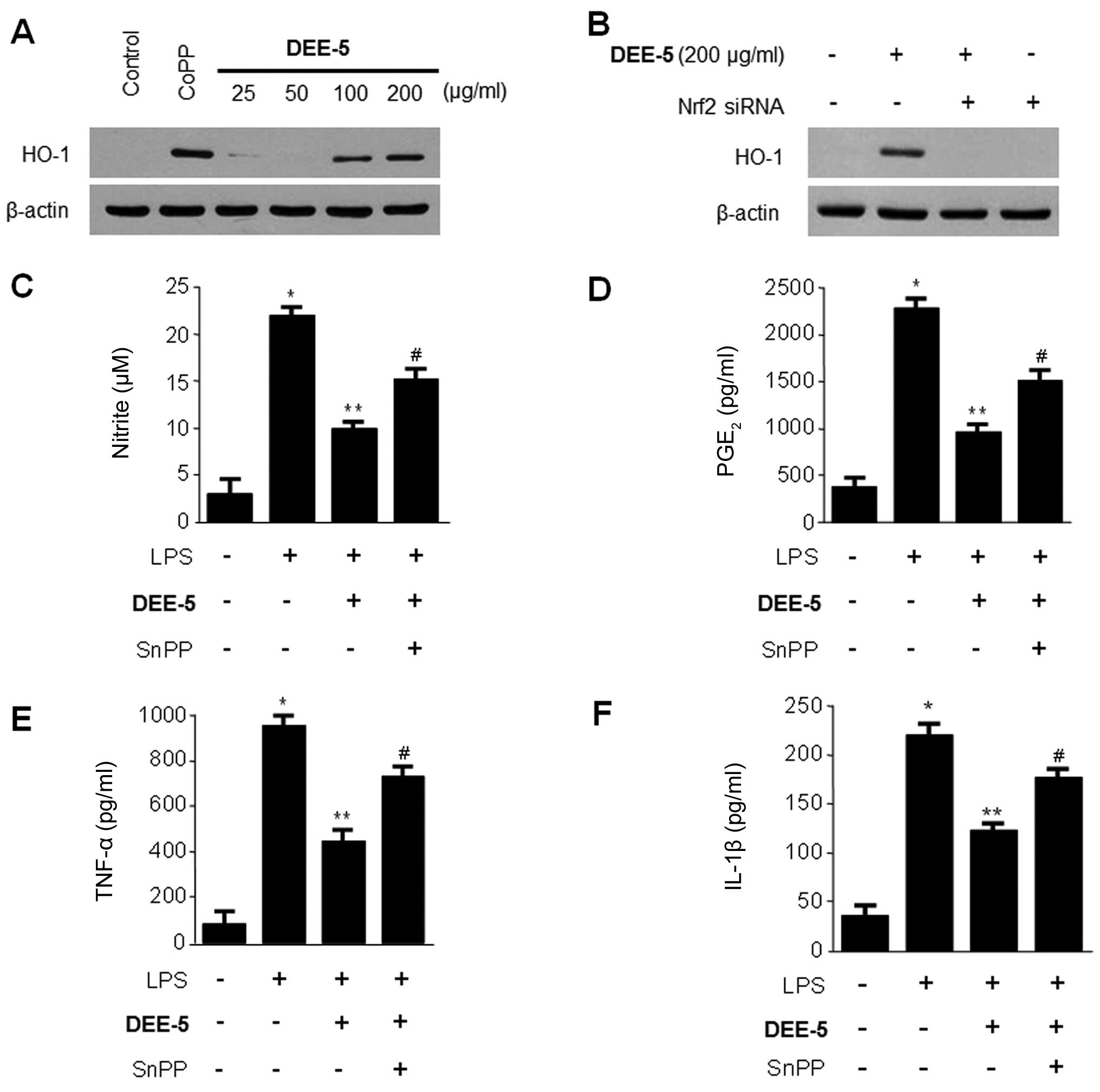|
1
|
Sung SH, Lee SY, Kang OH, Kwon DY, Chong
MS and Lee KN: Anti-allergic activity of Dojuk-San ethanol extract.
Korean J Orient Physiol Pathol. 25:438–444. 2011.
|
|
2
|
Kim HM, An CS, Jung KY, Choo YK, Park JK
and Nam SY: Rehmannia glutinosa inhibits tumour necrosis
factor-alpha and interleukin-1 secretion from mouse astrocytes.
Pharmacol Res. 40:171–176. 1999. View Article : Google Scholar : PubMed/NCBI
|
|
3
|
Tan W, Yu KQ, Liu YY, Ouyang MZ, Yan MH,
Luo R and Zhao XS: Anti-fatigue activity of polysaccharides extract
from Radix Rehmanniae Preparata. Int J Biol Macromol. 50:59–62.
2012. View Article : Google Scholar
|
|
4
|
Lau TW, Lam FF, Lau KM, Chan YW, Lee KM,
Sahota DS, Ho YY, Fung KP, Leung PC and Lau CB: Pharmacological
investigation on the wound healing effects of Radix Rehmanniae in
an animal model of diabetic foot ulcer. J Ethnopharmacol.
123:155–162. 2009. View Article : Google Scholar : PubMed/NCBI
|
|
5
|
Lin AS, Qian K, Usami Y, Lin L, Itokawa H,
Hsu C, Morris-Natschke SL and Lee KH: 5-Hydroxymethyl-2-furfural, a
clinical trials agent for sickle cell anemia, and its
mono/di-glucosides from classically processed steamed Rehmanniae
Radix. J Nat Med. 62:164–167. 2008. View Article : Google Scholar : PubMed/NCBI
|
|
6
|
Lee HS, Kim ST and Cho DK: Effects of
Rehmanniae radix water extract on renal function and renin
secretion rate in unanesthetized rabbits. Am J Chin Med.
21:179–186. 1993. View Article : Google Scholar : PubMed/NCBI
|
|
7
|
Yokozawa T, Kim HY and Yamabe N:
Amelioration of diabetic nephropathy by dried Rehmanniae Radix (Di
Huang) extract. Am J Chin Med. 32:829–839. 2004. View Article : Google Scholar
|
|
8
|
Choi J, Jung HJ, Lee KT and Park HJ:
Antinociceptive and anti-inflammatory effects of the saponin and
sapogenins obtained from the stem of Akebia quinata. J Med Food.
8:78–85. 2005. View Article : Google Scholar : PubMed/NCBI
|
|
9
|
Jung HJ, Lee CO, Lee KT, Choi J and Park
HJ: Structure-activity relationship of oleanane disaccharides
isolated from Akebia quinata versus cytotoxicity against cancer
cells and NO inhibition. Biol Pharm Bull. 27:744–747. 2004.
View Article : Google Scholar : PubMed/NCBI
|
|
10
|
Park HJ, Shim HS, Kim H, Kim KS, Lee H,
Hahm DH and Shim I: Effects of Glycyrrhizae radix on repeated
restraint stress-induced neurochemical and behavioral responses.
Korean J Physiol Pharmacol. 14:371–376. 2010. View Article : Google Scholar
|
|
11
|
Zhang SP, Zhou YJ, Liu Y and Cai YQ:
Effect of liquiritigenin, a flavanone existed from Radix
glycyrrhizae on pro-apoptotic in SMMC-7721 cells. Food Chem
Toxicol. 47:693–701. 2009. View Article : Google Scholar : PubMed/NCBI
|
|
12
|
Sekine-Osajima Y, Sakamoto N, Nakagawa M,
Itsui Y, Tasaka M, Nishimura-Sakurai Y, Chen CH, Suda G, Mishima K,
Onuki Y, et al: Two flavonoids extracts from Glycyrrhizae radix
inhibit in vitro hepatitis C virus replication. Hepatol Res.
39:60–69. 2009. View Article : Google Scholar
|
|
13
|
Shin EM, Zhou HY, Guo LY, Kim JA, Lee SH,
Merfort I, Kang SS, Kim HS, Kim S and Kim YS: Anti-inflammatory
effects of glycyrol isolated from Glycyrrhiza uralensis in
LPS-stimulated RAW264.7 macrophages. Int Immunopharmacol.
8:1524–1532. 2008. View Article : Google Scholar : PubMed/NCBI
|
|
14
|
Lee HY, Jung DY, Ha H, Kang SS, Kim JS and
Kim C: Induction of growth hormone release by Glycyrrhizae radix on
rat. J Biochem Mol Biol. 40:979–985. 2007. View Article : Google Scholar : PubMed/NCBI
|
|
15
|
Sato Y, Akao T, He JX, Nojima H, Kuraishi
Y, Morota T, Asano T and Tani T: Glycycoumarin from Glycyrrhizae
radix acts as a potent antispasmodic through inhibition of
phosphodiesterase 3. J Ethnopharmacol. 105:409–414. 2006.
View Article : Google Scholar : PubMed/NCBI
|
|
16
|
Lee HJ, Kim KA, Kang KD, Lee EH, Kim CY,
Um BH and Jung SH: The compound isolated from the leaves of
Phyllostachys nigra protects oxidative stress-induced retinal
ganglion cells death. Food Chem Toxicol. 48:1721–1727. 2010.
View Article : Google Scholar : PubMed/NCBI
|
|
17
|
Jung SH, Lee JM, Lee HJ, Kim CY, Lee EH
and Um BH: Aldose reductase and advanced glycation endproducts
inhibitory effect of Phyllostachys nigra. Biol Pharm Bull.
30:1569–1572. 2007. View Article : Google Scholar : PubMed/NCBI
|
|
18
|
Kim SH, Kim TS, Lee HJ and Yoo JC:
Enhancement of 1,25-dihydroxyvitamin D3- and all-trans retinoic
acid-induced differentiation of human leukemia HL-60 cells by
Phyllostachys nigra var. henonis Immunopharmacol Immunotoxicol.
29:119–129. 2007. View Article : Google Scholar
|
|
19
|
Kim SH, Kim TS, Kim SJ, Seong CN, Lee OH,
Lee HJ and Yoo JC: Inhibition of interleukin-12 production in mouse
macrophages via suppression of nuclear factor-kappaB binding
activity by Phyllostachys nigra var. henonis Immunopharmacol
Immunotoxicol. 29:131–139. 2007. View Article : Google Scholar
|
|
20
|
Sachithanandan N, Graham KL, Galic S,
Honeyman JE, Fynch SL, Hewitt KA, Steinberg GR and Kay TW:
Macrophage deletion of SOCS1 increases sensitivity to LPS and
palmitic acid and results in systemic inflammation and hepatic
insulin resistance. Diabetes. 60:2023–2031. 2011. View Article : Google Scholar : PubMed/NCBI
|
|
21
|
Lee H, Bae S, Choi BW and Yoon Y:
WNT/β-catenin pathway is modulated in asthma patients and
LPS-stimulated RAW264.7 macrophage cell line. Immunopharmacol
Immunotoxicol. 34:56–65. 2012. View Article : Google Scholar
|
|
22
|
Karpurapu M, Wang X, Deng J, Park H, Xiao
L, Sadikot RT, Frey RS, Maus UA, Park GY, Scott EW and Christman
JW: Functional PU.1 in macrophages has a pivotal role in NF-κB
activation and neutrophilic lung inflammation during endotoxemia.
Blood. 118:5255–5266. 2011. View Article : Google Scholar : PubMed/NCBI
|
|
23
|
Suh GY, Jin Y, Yi AK, Wang XM and Choi AM:
CCAAT/enhancer-binding protein mediates carbon monoxide-induced
suppression of cyclooxygenase-2. Am J Respir Cell Mol Biol.
35:220–226. 2006. View Article : Google Scholar : PubMed/NCBI
|
|
24
|
Samuelsson B, Morgenstern R and Jakobsson
PJ: Membrane prostaglandin E synthase-1: a novel therapeutic
target. Pharmacol Rev. 59:207–224. 2007. View Article : Google Scholar : PubMed/NCBI
|
|
25
|
Simmons DL, Botting RM and Hla T:
Cyclooxygenase isozymes: the biology of prostaglandin synthesis and
inhibition. Pharmacol Rev. 56:387–437. 2004. View Article : Google Scholar : PubMed/NCBI
|
|
26
|
Bogdan C: Nitric oxide and the immune
response. Nat Immunol. 2:907–916. 2001. View Article : Google Scholar : PubMed/NCBI
|
|
27
|
Kobayashi Y: The regulatory role of nitric
oxide in proinflammatory cytokine expression during the induction
and resolution of inflammation. J Leukoc Biol. 88:1157–1162. 2010.
View Article : Google Scholar : PubMed/NCBI
|
|
28
|
Tenhunen R, Marver HS and Schmid R: The
enzymatic conversion of heme to bilirubin by microsomal heme
oxygenase. Proc Natl Acad Sci USA. 61:748–755. 1968. View Article : Google Scholar : PubMed/NCBI
|
|
29
|
Tenhunen R, Marver HS and Schmid R: The
enzymatic catabolism of hemoglobin: stimulation of microsomal heme
oxygenase by hemin. J Lab Clin Med. 75:410–421. 1970.PubMed/NCBI
|
|
30
|
Motterlini R, Haas B and Foresti R:
Emerging concepts on the anti-inflammatory actions of carbon
monoxide-releasing molecules (CO-RMs). Med Gas Res. 2:282012.
View Article : Google Scholar : PubMed/NCBI
|
|
31
|
Alam J, Stewart D, Touchard C, Boinapally
S, Choi AM and Cook JL: Nrf2, a Cap'n'Collar transcription factor,
regulates induction of the heme oxygenase-1 gene. J Biol Chem.
274:26071–26078. 1999. View Article : Google Scholar : PubMed/NCBI
|
|
32
|
Jaiswal AK: Regulation of genes encoding
NAD(P)H:quinone oxidoreductases. Free Radic Biol Med. 29:254–262.
2000. View Article : Google Scholar : PubMed/NCBI
|
|
33
|
Kim JE, Kim SB, Kang OH, Shin IS, Kang SH,
Lee SH and Kwon DY: Inhibitory effect of water extract from
Dojuksan on LPS-induced proinflammatory cytokines production in
RAW264.7 cells. Kor J Herbology. 28:53–60. 2013. View Article : Google Scholar
|
|
34
|
Choi HG, Lee DS, Li B, Choi YH, Lee SH and
Kim YC: Santamarin, a sesquiterpene lactone isolated from Saussurea
lappa, represses LPS-induced inflammatory responses via expression
of heme oxygenase-1 in murine macrophage cells. Int
Immunopharmacol. 13:271–279. 2012. View Article : Google Scholar : PubMed/NCBI
|
|
35
|
Titheradge MA: The enzymatic measurement
of nitrate and nitrite. Methods Mol Biol. 100:83–91. 1998.
|
|
36
|
Jeong GS, Lee DS and Kim YC:
Cudratricusxanthone A from Cudrania tricuspidata suppresses
pro-inflammatory mediators through expression of anti-inflammatory
heme oxygenase-1 in RAW264.7 macrophages. Int Immunopharmacol.
9:241–246. 2009. View Article : Google Scholar
|
|
37
|
Lee DS, Kim KS, Ko W, Li B, Keo S, Jeong
GS, Oh H and Kim YC: The neoflavonoid latifolin isolated from MeOH
extract of Dalbergia odorifera attenuates inflammatory responses by
inhibiting NF-κB activation via Nrf2-mediated heme oxygenase-1
expression. Phytother Res. 28:1216–1223. 2014. View Article : Google Scholar : PubMed/NCBI
|
|
38
|
Kim KS, Cui X, Lee DS, Sohn JH, Yim JH,
Kim YC and Oh H: Anti-inflammatory effect of neoechinulin a from
the marine fungus Eurotium sp SF-5989 through the suppression of
NF-κB and p38 MAPK pathways in lipopolysaccharide-stimulated
RAW2647 macrophages. Molecules. 18:13245–13259. 2013. View Article : Google Scholar : PubMed/NCBI
|
|
39
|
Bonizzi G and Karin M: The two NF-kappaB
activation pathways and their role in innate and adaptive immunity.
Trends Immunol. 25:280–288. 2004. View Article : Google Scholar : PubMed/NCBI
|
|
40
|
Kim HG, Shrestha B, Lim SY, Yoon DH, Chang
WC, Shin DJ, Han SK, Park SM, Park JH, Park HI, et al: Cordycepin
inhibits lipopolysaccharide-induced inflammation by the suppression
of NF-kappaB through Akt and p38 inhibition in RAW 264.7 macrophage
cells. Eur J Pharmacol. 545:192–199. 2006. View Article : Google Scholar : PubMed/NCBI
|
|
41
|
Kensler TW, Wakabayashi N and Biswal S:
Cell survival responses to environmental stresses via the
Keap1-Nrf2-ARE pathway. Annu Rev Pharmacol Toxicol. 47:89–116.
2007. View Article : Google Scholar
|
|
42
|
Sugishima M, Higashimoto Y, Oishi T,
Takahashi H, Sakamoto H, Noguchi M and Fukuyama K: X-ray
crystallographic and biochemical characterization of the inhibitory
action of an imidazole-dioxolane compound on heme oxygenase.
Biochemistry. 46:1860–1867. 2007. View Article : Google Scholar : PubMed/NCBI
|
|
43
|
Vlahakis JZ, Kinobe RT, Bowers RJ, Brien
JF, Nakatsu K and Szarek WA: Imidazole-dioxolane compounds as
isozyme-selective heme oxygenase inhibitors. J Med Chem.
49:4437–4441. 2006. View Article : Google Scholar : PubMed/NCBI
|
|
44
|
Kinobe RT, Ji Y, Vlahakis JZ, Motterlini
R, Brien JF, Szarek WA and Nakatsu K: Effectiveness of novel
imidazole-dioxolane heme oxygenase inhibitors in renal proximal
tubule epithelial cells. J Pharmacol Exp Ther. 323:763–770. 2007.
View Article : Google Scholar : PubMed/NCBI
|
|
45
|
Ferrero-Miliani L, Nielsen OH, Andersen PS
and Girardin SE: Chronic inflammation: importance of NOD2 and NALP3
in interleukin-1beta generation. Clin Exp Immunol. 147:227–235.
2007.PubMed/NCBI
|
|
46
|
Mariathasan S and Monack DM: Inflammasome
adaptors and sensors: intracellular regulators of infection and
inflammation. Nat Rev Immunol. 7:31–40. 2007. View Article : Google Scholar
|
|
47
|
MacMicking J, Xie QW and Nathan C: Nitric
oxide and macrophage function. Annu Rev Immunol. 15:323–350. 1997.
View Article : Google Scholar : PubMed/NCBI
|
|
48
|
Liew FY and Cox FE: Nonspecific defence
mechanism: the role of nitric oxide. Immunol Today. 12:A17–A21.
1991. View Article : Google Scholar : PubMed/NCBI
|
|
49
|
O'Banion MK: Cyclooxygenase-2: Molecular
biology, pharmacology, and neurobiology. Crit Rev Neurobiol.
13:45–82. 1999.PubMed/NCBI
|
|
50
|
Lee DS, Ko W, Quang TH, Kim KS, Sohn JH,
Jang JH, Ahn JS, Kim YC and Oh H: Penicillinolide A: a new
anti-inflammatory metabolite from the marine fungus Penicillium sp
SF-5292. Mar Drugs. 11:4510–4526. 2013. View Article : Google Scholar : PubMed/NCBI
|
|
51
|
Lee DS, Li B, Im NK, Kim YC and Jeong GS:
4,2′,5′-Trihydroxy-4′-methoxychalcone from Dalbergia odorifera
exhibits anti-inflammatory properties by inducing heme oxygenase-1
in murine macrophages. Int Immunopharmacol. 16:114–121. 2013.
View Article : Google Scholar : PubMed/NCBI
|
|
52
|
Otterbein LE, Bach FH, Alam J, Soares M,
Tao Lu H, Wysk M, Davis RJ, Flavell RA and Choi AM: Carbon monoxide
has anti-inflammatory effects involving the mitogen-activated
protein kinase pathway. Nat Med. 6:422–428. 2000. View Article : Google Scholar : PubMed/NCBI
|















